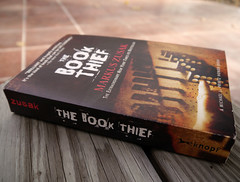 |
| 2012-08-11 - The Book Thief - 0014 (Photo credit: smiteme) |
hey and thanks for BLOG post of the Taiwan china ADIZ JAPAN PEARL HARBOR story, scary here now! OUCH On Tue, Dec 3, 2013 at 8:17 PM, Dr. Jim Castagnera <castagnerac@aol.com> wrote: > thanks > > > Dr. Jim Castagnera > Managing Director > K&C Human Resource Enterprises > 334 Stanley Avenue > Havertown, PA 19083 > http://jamescastagnera.wordpress.com/ > > > > > -----Original Message----- > From: Dan Bloom <danbloom@gmail.com> > To: dan bloom <danbloom@gmail.com>; Dr. Jim Castagnera <castagnerac@aol.com> > Sent: Mon, Dec 2, 2013 6:41 pm > Subject: print book thiref review PRINTING OUT AND READING IT NICE DAN > > The Book Thief > > By Jim Castagnera > Special to The History Place > 12/2/13 > > Watching The Book Thief in a packed theater last Saturday, I kept > recalling The Reader, a film I reviewed in this space back in 2009. > Both films are based on novels by Germanic writers. Both focus on a > love of words and books, and the power of the written word to surmount > the Nazi terror. Sophie Nelisse, who stars as Liesel in the new > film, even looks like a teen version of Kate Winslet, who won the > “Best Actress” Oscar for her performance in the earlier movie. > > The Book Thief begins with Liesel’s journey, just before the outbreak > of the war, to an unnamed German city, where she is placed with foster > parents, the Hubermanns, played by Geoffrey Rush and Emily Watson. We > learn that Liesel’s mother is a Communist, presumably destined for a > concentration camp. Not long after her arrival, Liesel accompanies > her stepfather to a book burning in the town square. Hans Hubermann > has been teaching his illiterate charge to read. He finds her to be a > quick study. So intense is her love of books that she spirits a > smoldering copy of H.G. Wells’ The Invisible Man from the bonfire. > > ADVERTISEMENT > > Later, tasked by her stepmother with delivering the Burgermeister’s > laundry to his palatial mansion, she discovers his succulent library. > Denied access through the front door, she ventures through a rear > window in order to “borrow” his books. Thus, she becomes the thief of > the film’s title. > > Meanwhile, Ma and Pa Hubermann have hidden a young Jew in their > basement. The young man’s father saved Herr Hubermann in the trenches > of the first Great War. Says Hans to Frau Rosa, “I owe him > everything.” And, as you might expect, everything is soon at stake in > this harrowing two-hour tale…, which, oddly, is narrated by Death. > > Yes, indeed, Death himself tells us this tale. Not having read the > much-beloved young-adult novel, I can only assume that as a literary > device this worked with teen readers. The book sat on the New York > Times Best Seller List for some 230 weeks. However, as a cinematic > technique in a motion picture aimed at an adult audience, it seemed to > me to be ill conceived. To me Death’s sappily sentimental soliloquies > soften the impact of what would be a more powerful film without his > intrusion. The straightforward, raw dramatization of The Reader is > the only confirmation I need for my conclusion. > > That being said, Rush, Watson and Nelisse provide terrific > performances. So does another youngster, Nico Liersch, as Liesel’s > best friend and stalwart confidant. I see some actor and actress > nominations coming out of this movie. > > Particularly well developed is the relationship between Hans and Rosa > Hubermann. At the film’s start, Hans comes across as the classic > hen-pecked husband and Rosa as the stereotypical shrew. Liesel’s > little brother having died on their journey to the Hubermann’s home, > Rosa complains, “We were supposed to get two children and two > allowances.” But there’s a whole lot more to Rosa than meets the eye > in that opening sequence. Watson infuses her Rosa with multiple > dimensions in a powerful performance. > > The same is true of Rush’s Hans. We learn that he has foregone > opportunities to work at his sign-painter’s trade because he won’t > join the Nazi Party. He hides Max, the Jewish refugee (Ben > Schnetzer), despite the terrible risk. He goes off to the war when > conscription dips down into the ranks of the aged. With calm > resignation, good humor, and courageous tenacity, he endures the > relentless slings and arrows of the worst time and place on a > much-troubled planet. > > And Liesel? A woman-child, who has buried a brother, fathomed that > she will never again see her mother, and dared to breach the > Burgermeister’s sanctum sanctorum, she represents all that remains > hopeful in the rotten, doomed world of mid-century barbarism. She > carries the future with her. Nelisse convinces us that she has the > heart and soul to do it. Death’s confirmation of this at the film’s > conclusion is satisfying, if also cursory and pat. > > On balance, The Book Thief was well worth the price of admission. But > it suffers by comparison to The Reader, a comparison I found > impossible to ignore. > > Rated PG-13 for some violence and intense depiction of thematic material. > Oscar® is a registered trademark of The Academy of Motion Picture Arts > and Sciences. > > > -- > > CLI FI CENTRAL: 'Cli-fi' – a new literary genre > http://pcillu101.blogspot.com/






No comments:
Post a Comment